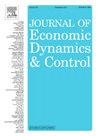不确定灾变环境下的最优收获
IF 2.3
3区 经济学
Q2 ECONOMICS
引用次数: 0
摘要
在海洋资源的开发利用中,渔业面临着越来越大的挑战。海洋资源是共有财产资源的典型例子,面临着经济浪费和过度开发的根本问题,这可能导致资源破坏,包括灭绝。过去几十年突显了生态灾难的相关性,例如西北大西洋鳕鱼种群的命运。这些事件不是以恒定的频率发生,而是随着时间的推移聚集在一起。我们的目标是研究假设在集群中可能发生意外生态灾害的情况下的收获管理问题。我们用标记的霍克斯过程来模拟这种聚类现象。我们将我们的值函数描述为Hamilton-Jacobi-Bellman不等式的唯一解。我们通过识别收获区和非收获区来描述最优收获策略。我们的结果是违反直觉的,挑战了普遍接受的信念,即当面临因灾害而导致的大量灭绝的风险增加时,最佳的采伐政策应该导致采伐活动的减少。这些发现对鱼类资源脆弱的本质提供了有价值的见解,可能解释西北大西洋渔业的崩溃。各国政府和国际当局必须采取行动,消除造成这种灾害的原因,例如污染和过度开发海洋资源,以便减少进一步毁灭的风险,并更好地评估和处理海洋资源灭绝的真正代价。我们通过数值分析进一步丰富了我们的研究,为最佳收获策略提供了更多的见解。本文章由计算机程序翻译,如有差异,请以英文原文为准。
Optimal harvesting under uncertain environment with clusters of catastrophes
The fishery industry is facing increasing challenges in the exploitation of marine resources. Marine resources are classic examples of common-property resources subject to fundamental problems of economic waste and over-exploitation, which may lead to resource destruction, including extinction. The past decades have highlighted the relevance of ecological catastrophes, such as the fate of the cod population in the Northwest Atlantic. These events do not occur with a constant frequency, but are clustered over time. Our objective is to study a harvesting management problem under the assumption that unexpected ecological disasters may occur in clusters. We model this clustering phenomenon using marked Hawkes processes. We characterize our value function as the unique solution to a Hamilton-Jacobi-Bellman inequality. We describe the optimal harvesting strategy by identifying the harvesting and non-harvesting regions. Our results are counterintuitive, challenging the generally accepted belief that, when facing an increasing risk of decimation due to disasters, the optimal harvesting policy should lead to a reduction in harvesting activity. These findings offer valuable insights into the fragile nature of fish resources, potentially explaining the collapse of fisheries in the Northwest Atlantic. Governments and international authorities must take action against the causes of such disasters, such as pollution and the overexploitation of marine resources, in order to reduce the risk of further decimation and to better assess and address the true cost of marine resource extinction. We further enrich our study with numerical analysis, providing additional insights into the optimal harvesting policy.
求助全文
通过发布文献求助,成功后即可免费获取论文全文。
去求助
来源期刊

Journal of Economic Dynamics & Control
ECONOMICS-
CiteScore
3.10
自引率
10.50%
发文量
199
期刊介绍:
The journal provides an outlet for publication of research concerning all theoretical and empirical aspects of economic dynamics and control as well as the development and use of computational methods in economics and finance. Contributions regarding computational methods may include, but are not restricted to, artificial intelligence, databases, decision support systems, genetic algorithms, modelling languages, neural networks, numerical algorithms for optimization, control and equilibria, parallel computing and qualitative reasoning.
 求助内容:
求助内容: 应助结果提醒方式:
应助结果提醒方式:


